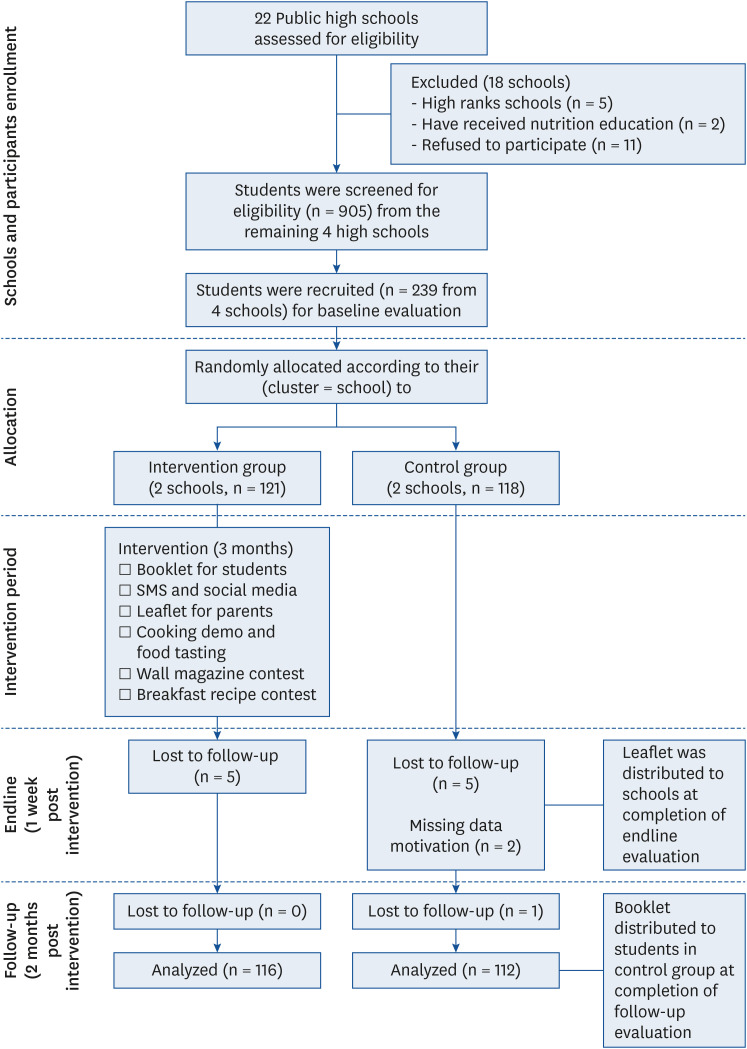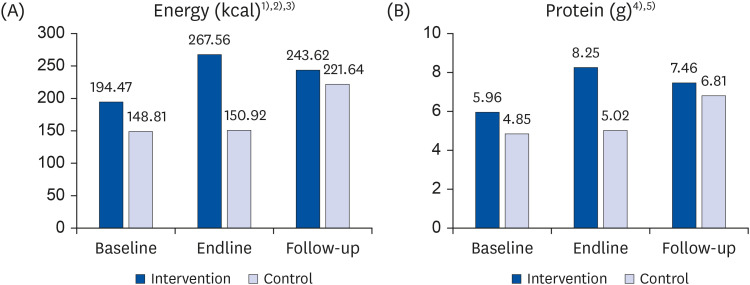Nutr Res Pract.
2021 Oct;15(5):639-654. 10.4162/nrp.2021.15.5.639.
School-based nutrition education improves breakfast-related personal influences and behavior of Indonesian adolescents: a cluster randomized controlled study
- Affiliations
-
- 1Department of Nutrition Science, Faculty of Public Health, Hasanuddin University, Makassar, South Sulawesi 90245, Indonesia
- 2Southeast Asian Ministers of Education Organization Regional Center for Food and Nutrition (SEAMEO RECFON)-Pusat Kajian Gizi Regional (PKGR) Universitas Indonesia, DKI Jakarta 10430, Indonesia
- 3Department of Epidemiology, Faculty of Public Health, Hasanuddin University, Makassar, South Sulawesi 90245, Indonesia
- 4Institute of Health Science of Kuningan, Kuningan, West Java 45561, Indonesia
- KMID: 2520665
- DOI: http://doi.org/10.4162/nrp.2021.15.5.639
Abstract
- BACKGROUND/OBJECTIVES
Many adolescents in developing countries skip breakfast. Innovative nutrition education (NE) strategies are needed to enhance knowledge and skills related to the breakfasts of adolescents in a low socioeconomic setting. The objective was to evaluate short- and long-term effects of a multi-strategy, school-based NE intervention on adolescents' breakfast-related personal influences and behaviors.
SUBJECTS/METHODS
An intervention study with a cluster randomized controlled trial design was conducted in 4 senior high schools in Makassar, Indonesia. The multi-strategy NE intervention was delivered for 3 months. Data were collected using a self-administered questionnaire and a 3-day breakfast recall (face-to-face interview). Wilcoxon, McNemar, and Mann-Whitney tests were used to determine intra- and intergroup differences.
RESULTS
Unlike knowledge, improvement was observed in attitude and self-efficacy scores in the intervention groups (IGs) (P < 0.01); however, no significant changes were observed in the control group (CG). More students showed improved motivation in the IG than in the CG (P > 0.05). Changes in breakfast frequency and macronutrient intake from breakfast were greater in the IG than in the CG (P < 0.05).
CONCLUSIONS
A multi-strategy NE intervention is effective in producing positive changes in breakfast-related attitude, self-efficacy, and motivation of adolescents from a low-middle socioeconomic setting. The intervention improved breakfast frequency and nutrient intake. This intervention has promise for sustaining the observed changes over the long-term.
Keyword
Figure
Reference
-
1. Moreno LA, Gottrand F, Huybrechts I, Ruiz JR, González-Gross M, DeHenauw S. HELENA Study Group. Nutrition and lifestyle in European adolescents: the HELENA (Healthy Lifestyle in Europe by Nutrition in Adolescence) study. Adv Nutr. 2014; 5:615S–623S. PMID: 25469407.
Article2. Bi H, Gan Y, Yang C, Chen Y, Tong X, Lu Z. Breakfast skipping and the risk of type 2 diabetes: a meta-analysis of observational studies. Public Health Nutr. 2015; 18:3013–3019. PMID: 25686619.
Article3. Adolphus K, Lawton CL, Dye L. The effects of breakfast on behavior and academic performance in children and adolescents. Front Hum Neurosci. 2013; 7:425. PMID: 23964220.
Article4. Edefonti V, Rosato V, Parpinel M, Nebbia G, Fiorica L, Fossali E, Ferraroni M, Decarli A, Agostoni C. The effect of breakfast composition and energy contribution on cognitive and academic performance: a systematic review. Am J Clin Nutr. 2014; 100:626–656. PMID: 24808492.
Article5. Doku D, Koivusilta L, Raisamo S, Rimpelä A. Socio-economic differences in adolescents' breakfast eating, fruit and vegetable consumption and physical activity in Ghana. Public Health Nutr. 2013; 16:864–872. PMID: 22030213.
Article6. Sivaramakrishnan M, Kamath V. A typical working-day breakfast among children, adolescents and adults belonging to the middle and upper socio-economic classes in Mumbai, India - challenges and implications for dietary change. Public Health Nutr. 2012; 15:2040–2046. PMID: 22647430.
Article7. Hardinsyah. Problems and Importance of Breakfast in Children. Santa Fe: Breakfast Symposium;2012.8. Irdiani W, Nindya TS. Correlation between the habit of eating breakfast, nutrient intake and nutritional status of female students in SMAN 3 Surabaya. Amerta Nutr. 2017; 1:227–235.9. Sari AFI, Briawan D, Dwiriani CM. Breakfast habit and its quality of schoolgirls in Bogor District. Jurnal Gizi dan Pangan. 2012; 7:97–102.10. Amrin SH. Relationship of breakfast habit and supplement consumption with hemoglobin status among adolescent girls in 10th state senior high school in Makassar [dissertation]. Makassar: Hasanuddin University;2014.11. Thasim S. Effect of nutrition education: the use of booklet and social media (Line) to motivation, self-efficacy, and breakfast behaviour among adolescents in 21th and 16th senior high school Makassar [master's thesis]. Makassar: Hasanuddin University;2016.12. Ministry of Health (ID). Basic Health Survey. Jakarta: Ministry of Health;2010.13. Hardinsyah , Aries M. Type of food for breakfast and its roles in daily nutrient intakes of school age children 6–12 years in Indonesia. Jurnal Gizi dan Pangan. 2012; 7:89–96.14. Harahap H, Widodo Y, Sandjaja , Khouw I, Deurenberg P. Quantity and quality of breakfast of children aged 2.0 to 12.9 years in Indonesia. J Indones Nutr Assoc. 2019; 42:31–42.15. Susanto F. Breakfast nutrient analysis among school age children in Jakarta area, Indonesia. Asian J Agric Food Sci. 2015; 03:455–460.16. Stang JS, Stotmeister B. Nutrition in adolescence. Temple N, Wilson T, Bray G, editors. Nutrition Guide for Physicians and Related Healthcare Professionals 2017. Cham: Humana Press;2017. p. 29–39.17. Bartfeld JS, Ahn HM. The school breakfast program strengthens household food security among low-income households with elementary school children. J Nutr. 2011; 141:470–475. PMID: 21228262.
Article18. Canterbury District Health Board. School Breakfast Programmes for Adolescents: Literature Review. Christchurch: Canterbury District Health Board;2014.19. Sekiyama M, Kawakami T, Nurdiani R, Roosita K, Rimbawan R, Murayama N, Ishid H, Nozue M. School feeding programs in Indonesia. Jpn J Nutr Diet. 2018; 76:86–97.
Article20. Ministry of Health (ID). Balanced Nutrition Guidelines. Jakarta: Directorate General of Nutrition and Maternal and Child Health Ministry of Health, Indonesia;2014.21. Usfar AA, Fahmida U. Do Indonesians follow its dietary guidelines?: evidence related to food consumption, healthy lifestyle, and nutritional status within the period 2000–2010. Asia Pac J Clin Nutr. 2011; 20:484–494. PMID: 21859671.22. Savage A, Februhartanty J, Worsley A. Adolescent women as a key target population for community nutrition education programs in Indonesia. Asia Pac J Clin Nutr. 2017; 26:484–493. PMID: 28429915.23. Hoelscher DM, Evans A, Parcel GS, Kelder SH. Designing effective nutrition interventions for adolescents. J Am Diet Assoc. 2002; 102:S52–63. PMID: 11902389.
Article24. Rachman PH, Mauludyani AVR, Ekawidyani KR, Februhartanty J. Barriers of implementing a nutrition education program for adolescents in rural Indonesian schools. Malays J Med Health Sci. 2020; 16:34–45.25. Februhartanty J. Nutrition education: it has never been an easy case for Indonesia. Food Nutr Bull. 2005; 26:S267–74. PMID: 16075577.
Article26. Tappe MK, Allensworth DD, Grizzell J. Promoting health in schools and universities. Fertman CI, Allensworth DD, editors. Health Promotion Programs: from Theory to Practice. San Francisco (CA): Jossey Bass;2010. p. 314–338.27. Wang D, Stewart D. The implementation and effectiveness of school-based nutrition promotion programmes using a health-promoting schools approach: a systematic review. Public Health Nutr. 2013; 16:1082–1100. PMID: 22850118.
Article28. Contento IR. Nutrition education: linking research, theory, and practice. Asia Pac J Clin Nutr. 2008; 17(Suppl 1):176–179. PMID: 18296331.29. Pérez-Rodrigo C, Aranceta J. School-based nutrition education: lessons learned and new perspectives. Public Health Nutr. 2001; 4:131–139. PMID: 11255503.
Article30. Meiklejohn S, Ryan L, Palermo C. A systematic review of the impact of multi-strategy nutrition education programs on health and nutrition of adolescents. J Nutr Educ Behav. 2016; 48:631–646.e1. PMID: 27720105.
Article31. Millar L, Kremer P, de Silva-Sanigorski A, McCabe MP, Mavoa H, Moodie M, Utter J, Bell C, Malakellis M, Mathews L, Roberts G, Robertson N, Swinburn BA. Reduction in overweight and obesity from a 3-year community-based intervention in Australia: the ‘It's Your Move!’ project. Obes Rev. 2011; 12(Suppl 2):20–28. PMID: 22008556.
Article32. Kebaili R, Harrabi I, Maatoug J, Ghammam R, Slim S, Ghannem H. School-based intervention to promote healthy nutrition in Sousse, Tunisia. Int J Adolesc Med Health. 2014; 26:253–258. PMID: 24096439.
Article33. Dehdari T, Rahimi T, Aryaeian N, Gohari MR. Effect of nutrition education intervention based on Pender's Health Promotion Model in improving the frequency and nutrient intake of breakfast consumption among female Iranian students. Public Health Nutr. 2014; 17:657–666. PMID: 23360695.
Article34. Elseifi OS, Abdelrahman DM, Mortada EM. Effect of a nutritional education intervention on breakfast consumption among preparatory school students in Egypt. Int J Public Health. 2020; 65:893–903. PMID: 32725393.
Article35. Fjeldsoe BS, Marshall AL, Miller YD. Behavior change interventions delivered by mobile telephone short-message service. Am J Prev Med. 2009; 36:165–173. PMID: 19135907.
Article36. Shahril MR, Wan Dali WP, Lua PL. A 10-week multimodal nutrition education intervention improves dietary intake among university students: cluster randomised controlled trial. J Nutr Metab. 2013; 2013:658642. PMID: 24069535.
Article37. Vander Wyst KB, Vercelli ME, O'Brien KO, Cooper EM, Pressman EK, Whisner CM. A social media intervention to improve nutrition knowledge and behaviors of low income, pregnant adolescents and adult women. PLoS One. 2019; 14:e0223120. PMID: 31647852.
Article38. Chau MM, Burgermaster M, Mamykina L. The use of social media in nutrition interventions for adolescents and young adults-a systematic review. Int J Med Inform. 2018; 120:77–91. PMID: 30409348.
Article39. Indriasari R, Thasim S, Nyorong M. Effect of nutrition education using booklet and mobile phone communications on changes of motivation, self-efficacy, and breakfast practice in Indonesian adolescents. Malays J Nutr. 2017; 23.40. Contento IR. Nutrition Education: Linking Research, Theory and Practice. London: Jones and Barlett;2011. p. 68–69.41. Prochaska JO, Velicer WF. The transtheoretical model of health behavior change. Am J Health Promot. 1997; 12:38–48. PMID: 10170434.
Article42. Mullan B, Wong C, Kothe E, O'Moore K, Pickles K, Sainsbury K. An examination of the demographic predictors of adolescent breakfast consumption, content, and context. BMC Public Health. 2014; 14:264. PMID: 24645936.
Article43. Wang D, Stewart D, Chang C, Shi Y. Effect of a school-based nutrition education program on adolescents' nutrition-related knowledge, attitudes and behaviour in rural areas of China. Environ Health Prev Med. 2015; 20:271–278. PMID: 25773683.
Article44. Au LE, Whaley S, Rosen NJ, Meza M, Ritchie LD. Online and in-person nutrition education improves breakfast knowledge, attitudes, and behaviors: a randomized trial of participants in the special supplemental nutrition program for women, infants, and children. J Acad Nutr Diet. 2016; 116:490–500. PMID: 26669795.
Article45. Bessems KM, van Assema P, Crutzen R, Paulussen TG, de Vries NK. Examining the relationship between completeness of teachers' implementation of the Krachtvoer healthy diet programme and changes in students' dietary intakes. Public Health Nutr. 2013; 16:1273–1280. PMID: 22894875.
Article46. Dzielska A, Mazur J, Nałęcz H, Oblacińska A, Fijałkowska A. Importance of self-efficacy in eating behavior and physical activity change of overweight and non-overweight adolescent girls participating in healthy me: a lifestyle intervention with mobile technology. Nutrients. 2020; 12:212.
Article47. Oddo VM, Roshita A, Rah JH. Potential interventions targeting adolescent nutrition in Indonesia: a literature review. Public Health Nutr. 2019; 22:15–27. PMID: 30348243.
Article48. Racey M, O'Brien C, Douglas S, Marquez O, Hendrie G, Newton G. Systematic review of school-based interventions to modify dietary behavior: does intervention intensity impact effectiveness? J Sch Health. 2016; 86:452–463. PMID: 27122145.
Article49. Bauer KW, Foster GD, Weeks HM, Polonsky HM, Davey A, Sherman S, Abel ML, Ruth KJ, Dale LC, Fisher JO. Breakfast in the classroom initiative and students' breakfast consumption behaviors: a group randomized trial. Am J Public Health. 2020; 110:540–546. PMID: 32078356.
Article50. Moore GF, Murphy S, Chaplin K, Lyons RA, Atkinson M, Moore L. Impacts of the primary school free breakfast initiative on socio-economic inequalities in breakfast consumption among 9–11-year-old schoolchildren in Wales. Public Health Nutr. 2014; 17:1280–1289. PMID: 24476560.
Article
- Full Text Links
- Actions
-
Cited
- CITED
-
- Close
- Share
- Similar articles
-
- Socio-Demographic Influences on Adolescents' Eating Behavior: Based on the Korean Youth Risk Web-Based Survey from 2015
- Association between breakfast and lifestyle, interest in beauty care, and attitude toward breakfast in high school girls in Incheon
- Development and Evaluation of an Elementary School Nutrition Education Program to Prevent Breakfast Skipping
- Rice-based breakfast improves fasting glucose and HOMA-IR in Korean adolescents who skip breakfast, but breakfast skipping increases aromatic amino acids associated with diabetes prediction in Korean adolescents who skip breakfast: a randomized, parallel-group, controlled trial
- A study on the weight control behavior according to cluster types of the motivation to use social media among university students in the Jeonbuk area






